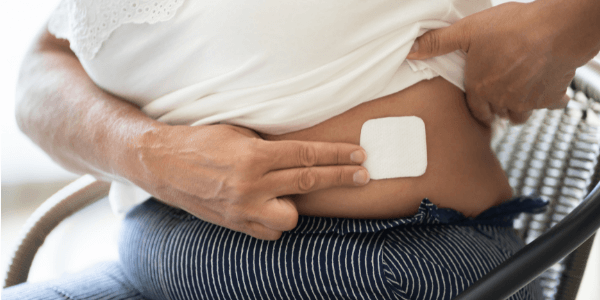Your guide to the menopause

King Edward VII’s Hospital consultant, Mr Michael Dooley is a specialist in gynaecology and women’s health. He is a British Menopause Society recognised menopause specialist and has co-authored a book with Sarah Stacey, Your Change, Your Choice, on looking after your health during the menopause and beyond. There are other gynaecologists at King Edward VII’s…
King Edward VII’s Hospital consultant, Mr Michael Dooley is a specialist in gynaecology and women’s health. He is a British Menopause Society recognised menopause specialist and has co-authored a book with Sarah Stacey, Your Change, Your Choice, on looking after your health during the menopause and beyond. There are other gynaecologists at King Edward VII’s Hospital, who have an interest, including Mr Michael Savvas.
Here, Mr Dooley explains what the menopause is, why it happens and how you can help manage your symptoms both with conventional medicine and with a holistic approach.
What is the menopause and is it different from the perimenopause?
The menopause actually means your last period and the technically correct term, is climacteric. which is the transition from having regular periods to no periods, due to the decreasing number of eggs and the symptoms are due to falling oestrogen. Sometimes, the term menopause transition rather than climacteric is used.
The period of time leading up to the menopause and the one or two years after is called the perimenopause and it is during this time that you may begin to experience symptoms such as mood swings, hot flushes, night sweats, poor sleep and dryness in your vagina.
If you are not managed correctly, symptoms can go on for some people for many years.
Can I become pregnant during my perimenopause or menopause?
The simple answer is yes, and it does depend on what age you are and how long it has been since your last period. Obviously, as you get older and the time after your last period increases, the chances are very low. If you have any doubt, it is important that you discuss it with your doctor.
What age does the menopause begin?
The decline in ovarian function and oestrogen secretion oestrogen generally can begin when a woman is in her 30s but the effects aren’t usually felt until around 40 to 45 years old.
When does the menopause end?
The menopause in some way never ends because the effects that the lack in oestrogen can cause continues. Sometimes, the acute symptoms of hot flushes, night sweats etc do stop after a year or so but for other women, they can continue for many years. Also, the long term problem of osteoporosis continues indefinitely.
For this reason, it’s important that the menopause is seen as a transition during which your health needs to be looked after, rather than a finite time in your life.

What are the symptoms of the perimenopause and the menopause?
The symptoms of the perimenopause and the menopause are the same. However, as the decline in oestrogen is more rapid towards the end of the perimenopause, your symptoms may feel more severe as you approach your menopause.
Often, the first sign of the perimenopause is a change in your menstrual cycle. You might notice that your periods may become irregular and they may be more or less painful and heavy. When you’re nearing your menopause, you may have a period every two weeks, and then go for a few months without one at all. Do talk to your doctor if you have problems with your periods, to ensure other causes are not missed. Please make sure you are up to date with your smears
Then, eventually, you’ll have no periods at all – and when you’ve been 12 months without one, you’re then said to be menopausal.
Both the perimenopause and the menopause cause other physical and emotional symptoms. The physical symptoms include:
- Hot flushes
- Night sweats
- Weight changes
- Headaches
- Dry skin
- Thinning skin
- Hair loss
- Vaginal dryness
- Painful sex
- Frequent cystitis
- Osteoporosis
- Poor sleep
The emotional symptoms include:
- Difficulty concentrating and remembering, so called ‘brain fog’
- Mood changes including a low mood and anxiety
- Mood swings
- Irritability
- Low self confidence
- Difficulty sleeping
- Tiredness
- Low libido
Some women experience some or all of the symptoms above, some or all of the time. Other women experience few symptoms and only very mildly. It’s also normal for one woman to experience different symptoms, of varying severity, at different times. Generally speaking, symptoms can start off gradually and become more severe over time.

Managing the symptoms with conventional medicine
There is medical help available to help you manage your symptoms if you’re struggling. Your GP can discuss your options with you and depending on your individual circumstances, you may be suitable for hormone replacement therapy, or HRT.
As the name suggests, HRT is a way of replacing the lost hormones, helping to relieve certain symptoms.
HRT is available in many forms including oral tablets, skin patches and gels. It’s also available as an implant that’s inserted under the skin. Oestrogens taken as patch or gel are usually preferred as they are associated with a lower risk of thrombosis or blood clots than oral tablets. Depending on your individual circumstances, HRT will either contain oestrogen only, or a combination of oestrogen and progesterone. Do discuss with your doctor the different types of HRT and whether they are synthetic or natural (bio-identical or body-identical) which similar to those which your body makes.
Vaginal creams, pessaries, rings, and lubricants containing oestrogen can also be prescribed to help relieve a dry vagina and painful sex. HRT can also help if you have a low libido.
HRT has many beneficial effects and can for the right person, significantly improve the quality of life. The specific risks are related to breast cancer and you should discuss it with your doctor as to your personal risks associated with the treatment that you have been provided with. Other lifestyle issues will also affect your risk of breast cancer and do discuss with them. The benefits of HRT generally outweigh these risks.
Dietary advice for managing the perimenopause and the menopause
Many women find that an integrated, holistic approach, either with or without HRT, helps to improve their symptoms.
Eating a diet rich in fruits, vegetables, wholegrains, healthy fats and lean proteins will benefit all of us. But if you’re experiencing your perimenopause or menopause, looking after your whole body health with your diet can make dealing with your symptoms easier to manage.
You should also ensure that you’re eating plenty of calcium rich foods too, such as dairy products and green leafy vegetables to help protect your bones. It’s recommended that you also take a calcium and vitamin D supplement which will further help to protect against weak bones.
Vitamin D is synthesised by the body when we’re exposed to sunlight. So, it’s especially important to take a vitamin D supplement during the winter months and all year round if you cover all of your skin with clothing or you don’t spend much time outside.
Some research suggests that consuming soya based foods and drinks such as tofu, edamame beans and soya milk can be beneficial for relieving menopausal symptoms. This is because soya contains isoflavones. Isoflavones are a type of phytoestrogen, or plant oestrogen. They’re capable of mimicking our natural oestrogens and can therefore potentially help to relieve symptoms.

Lifestyle advice to help manage menopausal symptoms
As well as looking at your diet, there are other lifestyle tips for helping to manage the symptoms of the perimenopause and the menopause.
If you’re struggling with hot flushes and night sweats, then the following can be helpful:
- Wear loose clothing made from breathable fabrics such as cotton, hemp, bamboo and linen
- Avoid manmade fabrics such as polyester, as these aren’t breathable and can cause you to overheat
- Wear layers that can be easily removed if you need to
- Sleep in a cool bedroom and use a fan if you need to
- Have a cool shower and an iced drink before bed
- Avoid hot, caffeinated drinks, alcohol, smoking and spicy foods as these can all trigger hot flushes and night sweats
If you’re experiencing a low mood, anxiety or stress, regularly practicing yoga and mindfulness can help to calm your mind and relax you.
Many women also find that cognitive behavioural therapy, or CBT, is beneficial. CBT is a type of talking therapy that can help if you’re struggling with a low mood or anxiety as a result of your menopause.
Good quality sleep is also important for good mental and physical health. Follow our tips for good sleep if you’re struggling to either fall asleep or stay asleep.
Some women find that herbal remedies that contain ingredients such as red clover, black cohosh, dong quai and evening primrose oil are effective at managing symptoms such as hot flushes and night sweats. Therapies such as reflexology and acupuncture can also prove beneficial.
There is no conclusive evidence that these do work, but they’re certainly worth a try. If you’re taking any other medications for other health concerns or the menopause, check with your doctor or pharmacist before taking any herbal supplements.

The importance of exercise
Exercise is advantageous throughout our lives, but as with a healthy diet, regular exercise is very beneficial for women experiencing the perimenopause and the menopause.
Taking regular exercise is beneficial for both our physical and our mental health. The loss of oestrogen during the perimenopause and menopause can cause the bones to weaken. Exercise helps to keep the bones and muscles strong and healthy which is particularly beneficial in menopausal women. This in turn can help to prevent or improve your balance and flexibility and help prevent trips, falls and broken bones.
Emotionally, exercise releases feel good chemicals called endorphins that help improve our mood and can be beneficial if you’re struggling with a low mood and anxiety.
Aim for a weekly mix of aerobic exercise such as walking, jogging or cycling, with weight bearing exercise such as lifting free weights and resistance exercise including squats and lunges.
The most important thing is, to enjoy yourself!
Other support and advice
Creating Harmony in the Menopause is a course that’s been developed by Mr Michael Dooley for the Poundbury Clinic, that offers an integrated approach to women’s health.
There is also help and support available via the British Menopause Society. If you’re concerned about weak bones or osteoporosis, advice is available from the Royal Osteoporosis Society.
Part of a harmonious approach to managing the symptoms of the menopause is to be as informed and aware as possible. Arming yourself with information on the effects of declining oestrogen levels on both your physical and emotional wellbeing and how to seek help can be beneficial in making this time of your life more harmonious.
Mr Dooley is also involved in a research project that’s looking at the mental health of women going through the perimenopause and the menopause, and how they may or may not express their feelings. This is in conjunction with the Kingston university School of Art.
If you can, try to open up about how you’re feeling to friends, family members, colleagues and other women of a similar age. You may find that they’re feeling the same way as you, and you may find it helpful to share tips and resources on how to manage symptoms of the perimenopause and the menopause.
You’re not alone, and although it can be a struggle, there are ways you can manage your symptoms and you don’t have to suffer in silence.
More information
- If you’re concerned about any aspect or symptom of the menopause, speak to your GP who can discuss a range of treatment options with you. This can range from HRT to CBT and many women find this help extremely useful.
- If you don’t have access to a GP, you can make an appointment with one of our same day private GPs.
- You can also make an appointment to see Mr Michael Dooley or Mr Michael Savvas either here at the King Edward VII’s Hospital, or via a video link.









